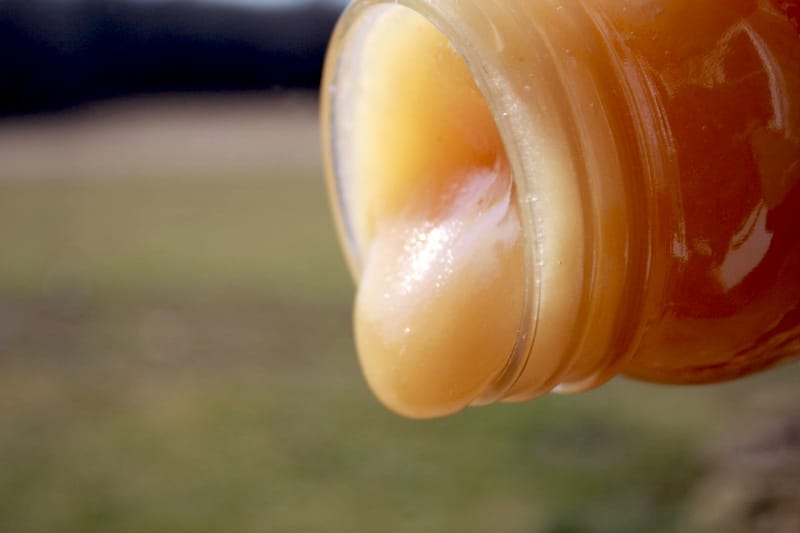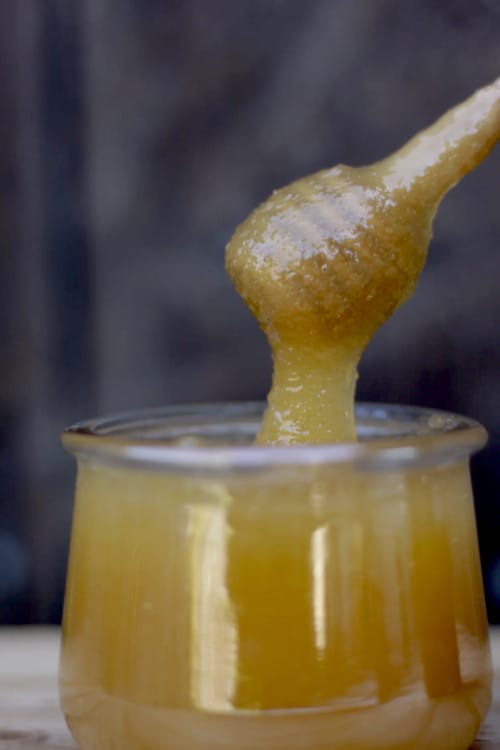Many people wonder why honey solidifies or “freezes” after a while. Some may even worry that they’ve been sold fake or adulterated honey, but that’s not the case! In fact, crystallization is a natural occurrence that happens with pure, unprocessed honey.
Crystallization, or the transformation of honey from a liquid to a semi-solid or solid state, is a completely natural process. Have you ever noticed that supermarket honey doesn’t crystallize? That’s because it has been processed, heated, and filtered.
Honey crystallization is a natural phenomenon, and it does not affect the quality of the honey, except for its texture and appearance. Crystallized honey is still fresh and retains its original qualities. In fact, some people prefer honey in its crystallized form, especially in Europe and America, because it’s easier to spread on bread or toast without making a mess. Additionally, the flavor can become richer when honey is in this state. There are two types of crystallization: fine-grained, which has a smooth, butter-like texture, and coarse-grained, which doesn’t look as appealing.

Modern technology even uses mixers to create controlled crystallization. By adding finely crystallized honey (similar to yeast) to the product, it helps achieve an even and stable homogenization, resulting in what we call honey cream.
It’s important to understand that honey crystallization is a natural characteristic of pure honey, and does not indicate poor quality.
Why Does Honey Crystallize?
Honey is a concentrated solution of various natural sugars, including fructose, glucose, maltose, and sucrose. It contains over 70% sugars and less than 20% water. The high sugar content in relation to the water causes the honey to become unstable, leading to crystallization. Honey is essentially supersaturated with sugars, making crystallization a natural process.
The main sugars responsible for crystallization are fructose and glucose. The ratio of these sugars can vary depending on the source of the nectar or honeydew, which influences the type of honey. Typically, fructose ranges from 25% to 40%, while glucose ranges from 30% to 44%. The balance between these two sugars determines how quickly honey will crystallize. Fructose is more soluble in water than glucose, so it tends to remain liquid.
When glucose crystallizes, it separates from the water and forms tiny crystals. As the crystallization process continues, these crystals spread throughout the honey, thickening it and eventually causing it to solidify. Some honeys crystallize evenly, while others may form two layers: a crystalline layer at the bottom and a liquid layer at the top. The size of the crystals also varies between honeys. Crystallized honey is usually lighter in color compared to its liquid form, since the glucose crystals are typically white. Darker honey varieties retain a brownish tint.

How Fast Does Honey Crystallize?
The rate at which honey crystallizes depends on several factors, including the source of nectar, processing methods, and storage conditions. Some honeys will crystallize within weeks of extraction, while others may stay liquid for months or even years.
Factors influencing the crystallization rate include:
- The sugar composition of the honey (nectar source)
- The processing methods (e.g., heating or filtering)
- The temperature at which it’s stored
Honey with a high glucose content and a low fructose-to-glucose ratio will crystallize more quickly, such as orange, eucalyptus, or heather honey. Honey with a higher fructose-to-glucose ratio, like fir or chestnut honey, crystallizes much more slowly and can remain liquid for years without special treatment.
For instance, orange honey may crystallize quickly in winter, while pine honey may take one to two years, and acacia honey typically doesn’t crystallize at all.
Honey with higher glucose content and lower moisture crystallizes faster. Honey with more moisture, on the other hand, may crystallize unevenly, separating into crystalline and liquid parts.
The presence of fine particles like pollen or bits of wax in raw honey acts as catalysts, promoting crystallization. Processed honey, which has been heated and filtered, lacks these particles and, therefore, tends to remain liquid.
Temperature and Crystallization
Storage temperature plays a significant role in honey’s crystallization. Honey crystallizes fastest between 10-15°C, while at temperatures below 10°C, the process slows down. At higher temperatures above 25°C, crystallization is slowed, and if heated to 40°C, the crystals dissolve. Temperatures exceeding 40°C can damage honey’s quality.
Liquefying Crystallized Honey
Crystallized honey can be returned to its liquid state by gently heating it in a water bath, ensuring that the temperature does not exceed 40°C. Overheating honey destroys its enzymes, aroma, and nutritional value. Therefore, it’s crucial to carefully control the temperature when liquefying crystallized honey.
Preventing Crystallization
To avoid crystallization, store honey in tightly sealed containers at room temperature. The optimal storage temperature is between 21-27°C. Avoid storing honey in cold environments (between 11-18°C) as this promotes crystallization. Refrigeration should be avoided as it accelerates the crystallization process.
For long-term storage, freezing honey is an option. Honey stored in the freezer does not crystallize, and when thawed, it returns to its natural state, remaining liquid and fresh.
If your honey crystallizes, there’s no need to worry. In fact, crystallization is a good sign that you’ve bought high-quality, pure honey. Adulterated honey is unlikely to crystallize.
Our honey, sourced from a trusted beekeeper, may crystallize at different rates depending on the variety and storage conditions. It’s always untreated and presented to you exactly as it’s harvested from the hive. Crystallization doesn’t affect the nutritional, biological, or dietary value of the honey. You can find top-quality organic honey in our store, available from a reliable, trusted beekeeper. Visit our website to purchase premium honey at great prices.
